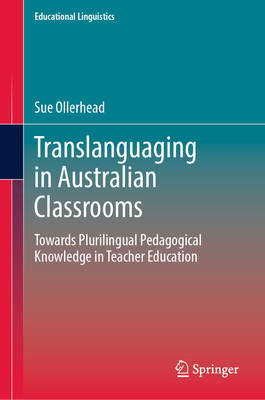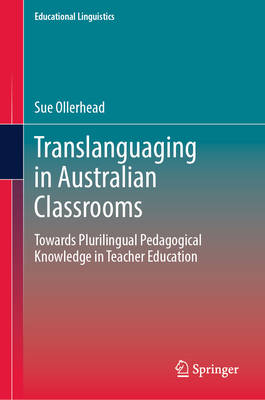
- Afhalen na 1 uur in een winkel met voorraad
- Gratis thuislevering in België vanaf € 30
- Ruim aanbod met 7 miljoen producten
- Afhalen na 1 uur in een winkel met voorraad
- Gratis thuislevering in België vanaf € 30
- Ruim aanbod met 7 miljoen producten
Zoeken
Translanguaging in Australian Classrooms
Towards Plurilingual Pedagogical Knowledge in Teacher Education
Sue Ollerhead
€ 117,95
+ 235 punten
Omschrijving
Australian classrooms are among the most linguistically diverse in the world, with more than 350 languages spoken across the nation. Yet, despite this rich reality, schools continue to be shaped by the enduring dominance of English monolingualism. Translanguaging in Australian Classrooms calls for a fundamental rethinking of teacher education, curriculum, and pedagogy to better reflect and harness the plurilingual repertoires of today's learners. At the heart of this book is the concept of Plurilingual Pedagogical Knowledge (PPK), a transformative framework that equips teachers to move beyond traditional literacy models and to value, mobilise, and affirm students' full communicative resources. Drawing on practitioner inquiry and richly detailed case studies, the book demonstrates how translanguaging can be enacted across subject areas, from mathematics and science to social studies and the arts. Challenging entrenched language ideologies, this volume positions teachers as agents of linguistic equity, capable of designing inclusive classrooms that support both academic success and cultural identity. It offers a compelling vision for teacher education in Australia, one that places linguistic justice at the centre of professional practice and reimagines the future of schooling through the dynamic possibilities of plurilingualism.
Specificaties
Betrokkenen
- Auteur(s):
- Uitgeverij:
Inhoud
- Aantal bladzijden:
- 120
- Taal:
- Engels
- Reeks:
- Reeksnummer:
- nr. 68
Eigenschappen
- Productcode (EAN):
- 9783032083760
- Verschijningsdatum:
- 25/11/2025
- Uitvoering:
- Hardcover
- Formaat:
- Genaaid
- Afmetingen:
- 156 mm x 234 mm
- Gewicht:
- 376 g

Alleen bij Standaard Boekhandel
+ 235 punten op je klantenkaart van Standaard Boekhandel
Beoordelingen
We publiceren alleen reviews die voldoen aan de voorwaarden voor reviews. Bekijk onze voorwaarden voor reviews.








